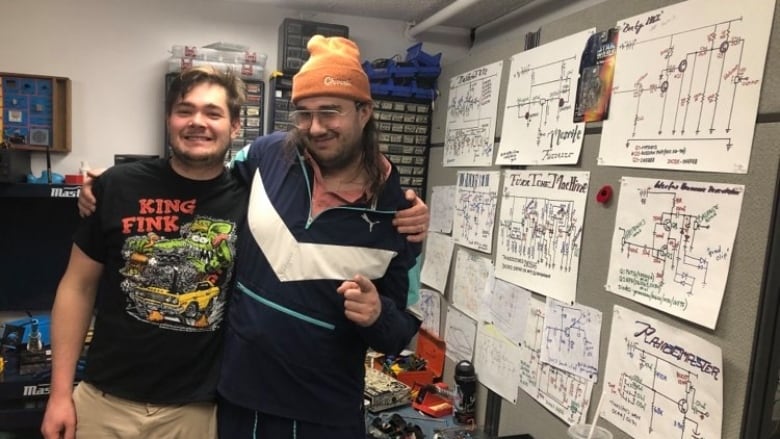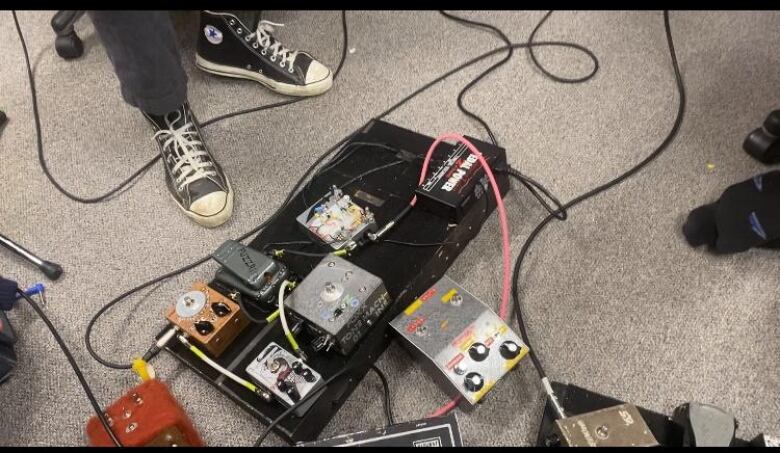Yukon musicians developing their own guitar fuzz pedal
Duo that is chasing the perfect fuzz tone hopes to eventually market and sell the product

In a basement office in downtown Whitehorse, in a space they share with a dressmaker and a filmmaker, two young musicians are trying to make magic from a pile of old electronic parts.
Patrick Hamilton and Dawson Beaulieu are building a fuzz pedal.
"I was getting very much enthralled with the idea of guitar pedals," said Hamilton. "I started to notice on eBay people seemed to be making and reselling clones or copies of classic guitar effects. For those original 60s effects, there's enough fandom around them that the prices have really skyrocketed, especially over past five or 10 years. So I started to see people making these works of art and selling them, so I thought maybe I could do that as well."
They're not alone.
Guitar pedals, or stomp boxes, are small devices that alter the sound of electric guitars. There are pedals that can recreate almost any sound, from making a guitar mimic a church organ or sound as though it's being played underwater.
But Hamilton and Beaulieu are chasing a perfect fuzz tone.
"Fuzz kind of started as a mistake," said Beaulieu. "It kind of just takes your signal and explodes it with dynamite."
The first example of a fuzz tone on recordcame on a Marty Robbins song, and it was a complete accident. Something went wrong with the recording console and the bass was heavily distorted. Even though it was unintentional, the sound stayed on the final mix.
After the Marty Robbins song became a hit, manufacturers started building pedals to recreate the sound intentionally. When the Rolling Stones had a huge hit with their fuzz-laden song Satisfaction, it became a sound everyone wanted.
From the Tone Bender to the Fuzz Tone to the Big Muff, a fuzz pedal became part of the signature sounds of guitarists like Jimi Hendrix and Jimmy Page. Mass production made pedals accessible for more guitar players, but there's something special about those original effects, even though they're very basic electronic devices.
Those original pedals now cost thousands of dollars, if you can even find them on sites like Reverb and eBay. There are plenty of companies that make modern versions, but you can also find the original plans for those pedals and, if you're like Beaulieu and Hamilton, track down some of those old components and build them yourself.

"If you're making a fuzz pedal, you're working off the lineage of something from the 1960s," said Hamilton.
"Early on we started by just cloning things," said Beaulieu. "Then you get into modifying things and changing the values of different components. So if you build a pedal and it's not quite sounding right, you might be able to change the transistor or the value of the capacitor and get the pedal more to what you want to hear."
The pair have been making pedals off and on for a while, and using them in their own work and sharing them with friends. But the ultimate goal for the two is to build and market their own fuzz pedal, something they're calling the Boaty, after the name of their company, Big Boat.
The pedal will contain elements of some of their favourite classic fuzz tones, with their own spin on things, and will hopefully be available in a couple of months.

It's another example of the do-it-yourself nature of the music scene in Yukon. There are people who build amps and guitars in the territory, and promoters and musicians have found creative ways to stage events like the recent Wondercrawl, a mobile art event that replaced a festival that was cancelled due to the pandemic.
"It makes me especially happy when bands play and I have made them a pedal," said Hamilton. "If the bass player and the guitar pedals are using a pedal we've made, it make us feel part of the scene."












_(720p).jpg)


 OFFICIAL HD MUSIC VIDEO.jpg)
.jpg)



























































































